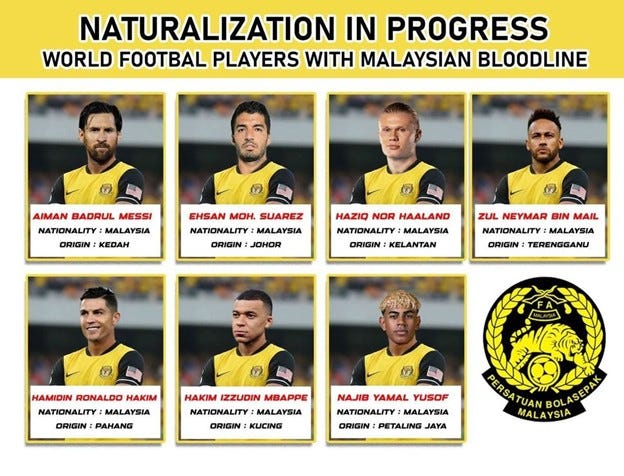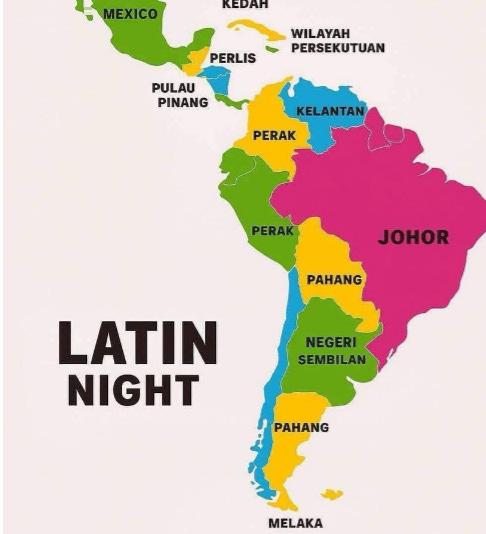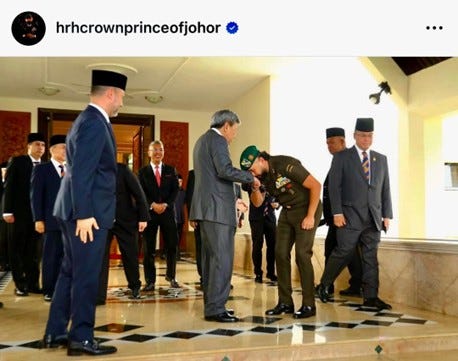Malaysia’s International Footy Hopes Dashed in Fraud
It’s all a matter of where your grandma’s from
Despite years of efforts, including hiring foreign coaches, funding a National Training Center described as a “beacon for football dreams” featuring three full-size pitches, modern facilities including a gym and rehabilitation room, and a commitment to developing future stars, Malaysia has remained lackluster on the international football stage, currently ranking 123rd of 2011 countries and territories across the globe.
The highest level the team ever reached was its 75th ranking 32 years ago, far below the relegation zone of 32 teams (since enlarged to 48) qualified to play in the quadrennial World Cup tourney, considered by many to be the world’s premier sporting event.
It has been a particular frustration for Tunku Ismail Sultan Ibrahim, the 41-year-old Crown Prince of Johor (TMJ), who was president of the Football Association of Malaysia (FAM) in 2017 and 2018 and who owns his own club, the Johor Darul Ta’zim, and has actually played with the team. His ardor for football is such that he was once accused of beating a rival fan and was suspected of having had acid thrown at a rival star although he was never charged.
So it was a relief when this year Harimau Malaya, or the Malaysian Tigers, in the third round of the 2027 Asian Football Confederation Cup qualifiers, beat Nepal in March 2-0, beat Vietnam in June 4-0, an unprecedented victory, and beat Singapore 2-1 on September 4.
Then it all came crashing down. Shortly afterwards, the disciplinary committee of the Fédération Internationale de Football Association (FIFA) suspended seven Malaysian players for a year and ordered them to pay a fine of 2,000 Swiss francs (US$2,497). and ordered FAM to pay 350,000 Swiss francs (US$437,237) for “doctored documentation.”
Malaysia, it seemed, had taken a page from Indonesia, which had previously dramatically improved its FIFA standing by recruiting grandchildren who could claim connection, however tenuous, to Indonesia from 350 years of Dutch colonization of what had been called the Spice Islands, which ended in 1945.
In January, Tunku Ismail wrote on social media: “We have identified 6-7 heritage players … and hope the Malaysian government could assist in the process of obtaining Malaysian passports in order for them to play in the Asian Cup 2027 qualifiers.”
But the seven heritage players’ “grandparents” who were supposedly born in Penang, George Town, Melaka, Johor, Kuching, and the Straits Settlements had never been anywhere near Malaysia. They were from Argentina, Spain, Brazil, and The Hague.
The result, along with a good deal of outrage, has been massive levity, as demonstrated by this new “FAM map” of Malaysia.
Officially, what began as a routine eligibility check turned into a formal FIFA investigation although some accused the Football Association of Indonesia of ratting Malaysia out. There have been widespread rumors that Indonesian President Prabowo Subianto himself had called foul, raising the matter to the level of international incident. Football Association president Erick Thohir was forced to deny allegations that Indonesia was involved in FIFA’s decision to impose sanctions.
Tunku Ismail publicly questioned the abrupt decision to sanction Malaysia’s team, demanding explanations for what he described as a sudden reversal in the governing body’s position and asking in a social media statement, “Fifa had already approved it (the naturalization) before, so why has the decision changed now? What happened that led to such a sudden decision? Was there an external party involved in influencing Fifa’s decision?”
There was none, although one fan, in a phone conversation, said, “It could have been the Singaporeans, Vietnamese, or Indonesians. Anybody, as it was so blatant. They haven’t beaten Vietnam for years. It was pure cheating. Plain and simple for anyone to see.”
Red-faced Malaysian officials attempted to blame a clerical error, but a 6,000-word report from FIFA detailed how the seven foreign-born players were made to appear Malaysian through doctored ancestral birth certificates which turned foreign grandparents into “Malaysians” changing birthplaces from Spain, Argentina, Brazil, and the Netherlands to Penang, Melaka, Johor, and Sarawak. In a damning report, FIFA had found that the certificates submitted to its eligibility proceedings had been forged. The investigating committee, chaired by Jorge Palacio of Colombia, called it “pure and simple, a form of cheating.”
The next question was who was responsible for the forgeries. One angry writer to the news website Malaysiakini denounced the government as “complicit in this scandal. Home Minister Saifuddin Nasution Ismail’s defense that ‘due process’ was followed collapses under FIFA’s findings. Saifuddin had assured FAM that it had nothing to fear, as long as procedures followed existing laws. But how do you defend a process when FIFA discovered that none of the players’ grandparents were born or domiciled in Malaysia?”
Malaysians “will now foot the bill for FAM’s dishonesty,” another wrote. “Taxpayers bankroll stadiums, academies, and the very officials who orchestrated this scam – and now they are punished again with a hefty fine. This is not mere negligence; it is criminal dishonesty funded by the public purse.”
The FAM says it’s legally barred from disclosing details about the seven foreign players at the center of the FIFA ruling, citing Malaysian laws governing official secrets and passport procedures. It stressed that FIFA’s claim that the players “obtained or were aware of forged documents” was unfounded, as no solid evidence had been presented to support the allegation.
A clue to the perp’s identity may have appeared on the Instagram page of Tunku Ismail Sultan Ibrahim, which showed him bending in apology to kiss the hand of Sultan Sharafuddin Idris Shah Al-Haj, the Sultan of Selangor, as a gaggle of dignitaries looked on.
“He had to apologize to the Selangor Sultan, but he denied any involvement,” said a Kuala Lumpur-based source with links to the government who asked to remain nameless. “The politicians gave out citizenships to the players on the instruction of the Johor Crown Prince, but nobody wants to say it.”
Accusing the royalty is verboten in Malaysia. The local press is silent. The nine royal families, who rotate the kingship between them under the title Kebawah Duli Yang Maha Mulia Seri Paduka Baginda Yang di-Pertuan Agong, (He who is below the dust of the exalted sole, His Majesty, He Who Is Made Lord) every five years, continue to receive outsize reverence from the Malay Muslim populace, with nobody daring to question a matter like forging the ancestry of the national football team.
The opposition Perikatan Nasional coalition has called on the government to launch a Royal Commission of Inquiry following the allegations of document fraud involving the footballers. Given the possibility of the crown prince’s involvement, that isn’t likely to happen, especially since the head of Perikatan Nasional, Muhyiddin Yassin, hails from Johor.





The Johor royal family are a bunch of gangsters. The Wikipedia article on Sultan Iskandar is shocking. Check out the "Controversies" section listing all the people TMJ's grandfather and relatives assaulted and killed.
Sad, but also hilarious😂